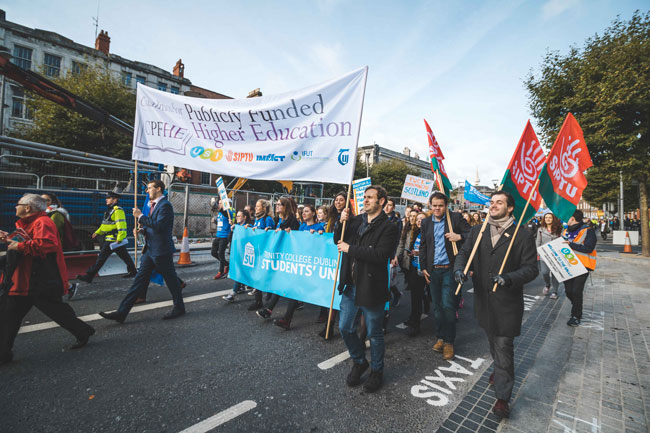Yesterday’s #EducationIs demonstration organised by the Union of Students in Ireland (USI) saw over 10,000 students, interest groups and members of the wider public descend on the streets of Dublin to advocate for a publicly funded third-level education system. With the Joint Oireachtas Committee on Education and Skills to decide on the findings of the Cassells report by March 2017, there was a greater sense of urgency and effort from individual students’ unions who oppose the introduction of an income-contingent loan scheme – one of the options outlined by Cassells.
As a result of having something tangible to campaign against, the annual demonstration – which was replaced last year with a voter registration drive – saw a greater turnout than in the union’s demonstrations in recent years. This relatively high attendance can also be attributed to the efforts put in by students’ unions across the country. Maynooth Students’ Union (MSU) even agreed to pay for one student’s €3000 contribution fee next year if over 500 Maynooth students attended. However, at the demonstration, President of MSU, Dillon Grace, told The University Times that there were only 450 affiliated MSU students in attendance.
The support from wider strands of the public and interest groups also shows that there is broad support for a change in how higher education in Ireland is funded
This demonstration also stood out from others in that it saw an unprecedented level of support from College. Speaking to students in Front Square prior to the march, Vice-Provost, Prof Chris Morash, told the delegation that they were “marching for tomorrow and for future generations” and also outlined that “funding for universities in Ireland cannot continue the way it is” – a sentiment widely acknowledged by union leaders and politicians alike. Trinity students were also permitted to miss class to attend the march. This support from College highlights that cuts to funding in recent years have not only negatively impacted students, but staff also.
Although this official support from college hierarchies wasn’t seen across the board, some college staff in institutions like Letterkenny Institute of Technology (LYIT) and Galway-Mayo Institute of Technology (GMIT) were also supportive of student participation in the march.
The support from wider strands of the public and interest groups also shows that there is broad support for a change in how higher education in Ireland is funded. Speaking to The University Times, President of USI, Annie Hoey, discussed how “it’s significant in that it’s not just students here, it’s parents, staff, trade unions, the general public are all calling for the same thing: for the government to make a historic decision and to invest in education, to make it publicly funded because it’s a public good”. President of the Limerick Institute of Technology Students’ Union (LITSU) echoed this sentiment, telling The University Times that “a collective voice is what gets change”.
The impact that the demonstration will have is unknown, however. A predominantly state-funded system, advocated for by Hoey and others, which would abolish the student contribution seems like an unrealistic proposal in the current climate. Such a system would cost the exchequer an estimated €1.3 billion per year by 2030. To facilitate this, there would have to be significant increases in taxes or a considerable reallocation of funds from other services such as health and social welfare in order to fund it. Although the majority of students marching yesterday would like to see such a system implemented, a recovering economy combined with future economic challenges such as Brexit suggest that it is not a reality at the present time.
The third option outlined in the Cassells report – the continuation of the current student contribution charge coupled with increased state investment – is a rational compromise in the current climate
In this month’s budget, the government allocated €36.5 million to higher education. Although this was the first investment in higher education since 2011, the figure was widely criticised as barely scraping the surface. Undoubtedly, higher education is in need of greater investment. However, considering the overall cost of this budget to the exchequer was €1.3 billion – a figure criticised by the independent budget watchdog, the Irish Fiscal Advisory Council, as going beyond what was prudent – the investment needed to fund a “free fees” system is likely not available at the present time.
The loan scheme that was being campaigned against, however, is possibly the area where yesterday’s demonstration will be most effective in the impact it has. Placing a significant amount of debt on students once they graduate would prevent people from lower socio-economic backgrounds from even applying for third-level and isn’t an option that the Oireachtas committee should be pursuing.
That said, as the beneficiaries of the education we receive, it seems reasonable that we contribute to our education to some extent. Therefore, the third option outlined in the Cassells report – the continuation of the current student contribution charge coupled with increased state investment – is a rational compromise in the current climate.
Despite some revellers engaging in “mosh pits” and lighting flares during the demonstration (actions that threaten to trivialise the seriousness of the protest), the march was a success in that it highlighted the groundswell of support for a change in how higher education is funded in Ireland. In his speech in Front Square, Morash explained that “a Trinity student is someone who is willing to act responsibly…[by attending] you’re saying to me here today ‘I’m doing something’”. The thousands of students across the country involved yesterday are indeed advocates for change and should be commended. Although the movement may win the argument when it comes to a student loan scheme, a publicly funded third-level system may be too much to ask.







